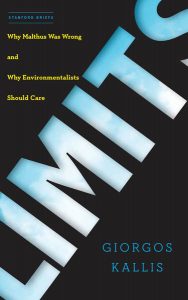Bibliographic information: Stanford University Press, Stanford, CA, 2019. 168 pp., $14.00 pb
ISBN: 9781503611559
If modernity was marked by an obsession around ‘man’ as a figure of finitude, as Foucault once suggested, much of contemporary ecological thinking seems shaped by a concern around planetary finitude. The image of the earth as inherently limited and its resources scarce frames both the contemporary academic discourse and the social imaginary around climate catastrophe, ecology and economics. In popular imaginations of the near future the condition of scarcity persists doubly – either as overcome by technology, development and unlimited economic growth or alternatively, as administered through increasing authoritarianism, state violence and capitalist dystopia. Given such terrible choices, a different vision of the politics of limitation seems urgent. Yet even when theorists critique the idea of natural scarcity, pointing out how ‘scarcity’ and ‘nature’ are historically produced alongside capitalism (Moore 2016), there is often no positive picture of the other roles limitation could play (beyond that of scarcity) in a post-capitalist world.
Giorgos Kallis’ Limits: Why Malthus Was Wrong and Why Environmentalists Should Care intervenes in such debates by analyzing the intellectual sources of the concept of scarcity and proposing an alternative account of limitation oriented towards practices of abundance and autonomy. Key for Kallis is the idea that under capitalism, the image of nature as inherently scarce reproduces the desire for limitless growth:
Without limits, capitalism’s quest for endless growth does not make sense. Malthus and other early priests of capitalism constructed a picture whereby unlimited human wants clash with a limited world. Scarcity and growth became an inseparable pair, with limits spurring efforts for growth. My thesis is that it is only when we begin to accept the world as abundant that we can contemplate limiting our wants and delimiting a safe space for our freedom (4).
The wager of the book then, is that environmentalist movements need an alternative vision of limits that begins not from a premise of nature as scarce but rather as abundant, and of limitation not as enforced by outside conditions but rather adopted intentionally as an exercise of political autonomy.
Kallis is a political ecologist and ecological economist by training, as well as an author of numerous books on degrowth. While Limits is not about degrowth per se, it serves as a theoretical glimpse into Kallis’ greater political project as well as the imagined subject to which it is addressed. At times, the book reads as more essayistic than academic, perhaps intended for a wide audience of environmentalists and academics alike. Even so, Kallis is insightful and original, bringing philosophical reflections on a topic that many have found difficult to conceptualize.
The first two chapters of Limits dive into the notion of scarcity within the intellectual history of economics. The first chapter is a contextual reading of Malthus’ infamous Essay on the Principle of Population. Kallis discovers there what he calls the ‘principle of scarcity’, the familiar yet largely abandoned idea that because the rate of population growth has the potential to exceed the rate of agricultural output, scarcity is a constant fact of human life. What is interesting in Kallis’ reading is the extent to which Malthus appears not as a prophet of doom but on the contrary as an apostle of economic growth. For Malthus, the inequality and poverty created by scarcity was good, because it provided ‘the foundation of industry’ leading ‘not to despair but activity’ (19-20). Thus, Malthus neither wanted to alleviate poverty caused by scarcity nor was interested in strengthening reproductive autonomy for women. Rather, as Kallis explains, ‘the genius of [Malthus’] idea was that he managed to make scarcity compatible with growth, limits with no limits’ (29). In Malthus we see the first articulation of a delirium peculiar to capitalism, constant scarcity matched by unlimited growth.
Chapter 2 extends this study, analyzing how the imbrication of scarcity and growth was preserved both among explicitly anti-Malthusian mainstream economists such as Lionel Robbins and Robert Solow and among Neo-Malthusian ecologists such as Donella Meadows and the notoriously racist Garret Hardin. Drawing on Robbins’s 1932 Essay on the Nature and Significance of Economic Science, Kallis argues that economics substitutes Malthus’ image of exponential population growth with a new principle of unlimited human wants. Similarly, through ecologists such as Meadows and her famous 1972 Limits to Growth, Kallis locates a new conception of the world as limited, bearing a finite amount of energy and matter. In both cases, Kallis is suspicious of how these authors reproduce capitalism’s underlying assumption of scarcity, the notion that there isn’t enough for everyone, as this creates the conditions for further accumulation. For Kallis this mutual imbrication of scarcity and growth forecloses ecological questions, reducing them from political debates about the good life into ‘sterile scientific disputes of how growth can be best sustained’ (38).
In chapter 3, Kallis distinguishes what he calls a heteronomous understanding of limits, forced on society by God or nature, from an autonomous understanding of limits, a collective practice of self-limitation. Popular discourse on environmental limits presents them as external ‘planetary boundaries’ that are revealed by science and ought to be hylomorphically imposed on contemporary societies. Kallis outlines several shortcomings of such an orientation; it is susceptible to a fatalism as it presents an understanding of limits abstracted from social life; it tends to elude political questions about who and what should be limited, how limitation ought to be distributed; it reasserts scarcity which fascism seeks to administer and capitalism seeks to preserve.
Yet counterintuitively, an autonomous conception of limits requires one to ‘accept the world as abundant’ (4). This is because, according to Kallis, accepting the world as abundant creates an ethics of obligatory, nonreciprocal sharing – a kind of commoning – that wards off the desire for conquest and depletion.
It is [capitalism’s] inability to share the abundance it produces that creates a constant impetus to move outward in the direction of more. Future expansion justifies current inequality and inequality makes everyone work hard for expansion (127).
Here, Kallis is building on anthropological insights that explain how social practices that are based on a premise of abundance – for example public rituals of expenditure, mass forgiveness of debt, festivals of consumption – can help societies ward off rigid hierarchies by preventing accumulation and dispersing wealth. Kallis is extending this line of argumentation towards environmentalism. Without rigid hierarchies and concentration of wealth, the social conditions that create scarcity and growth are hindered. Thus, expenditure and nonreciprocal sharing present for Kallis, ‘a theory for maintaining abundance’ (52-53). If one understands the world as abundant, one might find fewer reasons for destroying it through accumulation.
Chapter 4 knits together the work of philosophers Cornelius Castoriadis and Michel Foucault with insights from psychoanalysis and ancient Greek history. The main proposition is that ancient Greek culture was one of self-limitation as formed in reaction to the invention of money (78). Money is limitless, the chapter argues, its valorization seemingly endless and the desire for its accumulation seemingly insatiable. Greek theater, philosophy and cosmology developed as a response to the invention of coinage, Kallis suggests, to reinforce an ethics and politics of self-limitation. Theatre contemplated themes of tragedy and loss. Philosophy proliferated techniques of self-government and care cultivating one’s desires to establish a sense of self-mastery and freedom. Metaphysics contemplated the relation between an unlimited substance and self-limitation. The chapter feels most speculative when Kallis dips into psychoanalysis. Drawing on Freud’s idea of the death instinct, Kallis proposes a ‘built-in destructive drive’ within civilization, a desire for self-dissolution and expenditure (92). Under capitalism this desire is suppressed and displaced onto others. In other words, the limitless expansion of money, the unavowable growth for growth’s sake that drives capitalism, is simultaneously a ‘psycho-social drive’ towards overcoming death itself (93). The project of limitation then is also one of establishing a new social relation with death.
Chapter 5 reiterates the arguments made throughout, adding some important qualifiers that help clarify the political vision behind this book. Most significantly, Kallis clarifies that to challenge the structures that produce an unlimited economy, limits cannot be a fantasy of individual escape, but must be a universal political ambition. Whereas abundance and expenditure are public virtues, the individual is marked for Kallis by a certain level of sobriety punctuated by wasteful outbursts. In Capital, Marx famously observes how capitalism obscures its historical origins through a moral tale between two sorts of people, the ‘diligent, intelligent and above all frugal elites and lazy rascals, spending their substance and more, in riotous living’ (Marx 1990: 929). This story of so-called primitive accumulation not only obscures the conditions of violence and colonialism that gave rise to capitalism but demonstrates how the capitalist mode of production tends to naturalize itself and project its conditions of possibility infinitely backwards in time. The imagined archetype of Kallis’s book is not the frugal elite but rather a ‘Mediterranean woman or man who, having liberated desire and embraced contradiction, leads a sober life punctuated by wasteful outbursts’ (115). Limits is an attempt to present us with an alternative ethical orientation, one that deserves attention as it forces us to break the spell of capital’s moral tale even as the book’s historical and political coordinates remain fuzzy.
Though Kallis provides a broad outline, fundamental political questions remain. First, while the language of autonomous and heteronomous limits is useful to some extent, as it works against a depoliticizing and positivist attitude towards ecological limits, it also seems to set up a self-same subject at the heart of Kallis’s book, that at times prevents him from addressing the question of subjectivation. In other words, even as Limits gestures towards the subject of self-limitation, there is little about the techno-psycho-social conditions that subtend the production of subjectivity. This is expressed most clearly when Kallis attempts to deal with questions of desire, as in his discussion of the economic idea of unlimited human wants or the psychoanalytic notion of the death drive. The problem is that Kallis’ analyses remain too ideational, too invested in ancient Greek philosophy, economics and psychoanalysis as disciplines rather than as ideological reinforcements of the broader conditions that produce them. One way that Kallis’ project and perhaps the project of degrowth can be extended therefore is to seek for the affective economies that would subtend limitation. How do we invest desiring production towards something other than growth? What would it mean to desire limitation as a political (rather than purely ethical) matter? Such a line of inquiry would open the horizons of degrowth more clearly towards anthropological questions of kinship, family, queerness, nationalism, race, colonialism and how these are marshalled within the desiring production of growth. They would also bear directly on issues of strategy. How does one outline a politics of self-limitation in a neoliberal developmentalist context, where the fetishization of economic growth is also linked with articulations of authoritarianism, extractivism and nationalism? How does one articulate a politics of limitation across inequalities of class, race and gender. But perhaps all this is too much to expect out of such a short book – one must after all, reflect on the limits of writing itself. Yet that it even inspires them demonstrates how generative Limits is.
30 March 2021
References
- 1990 Capital: Volume I New York: Penguin.
- 2016 Capitalism and the Web of Life: Ecology and the Accumulation of Capital London: Verso.



 Author:
Author: 

